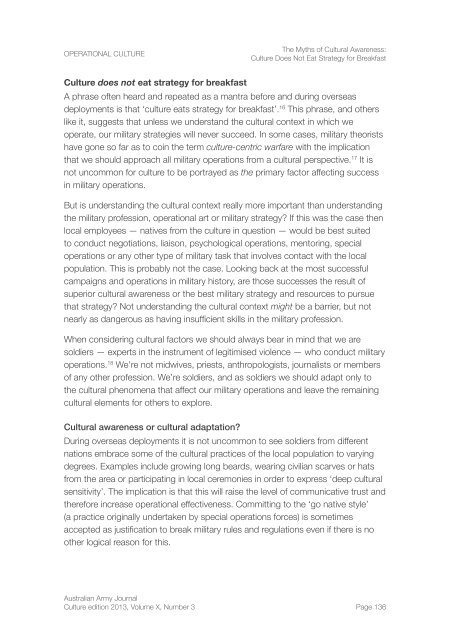Australian Army Journal
Australian Army Journal
Australian Army Journal
You also want an ePaper? Increase the reach of your titles
YUMPU automatically turns print PDFs into web optimized ePapers that Google loves.
OPERATIONAL CULTURE<br />
The Myths of Cultural Awareness:<br />
Culture Does Not Eat Strategy for Breakfast<br />
Culture does not eat strategy for breakfast<br />
A phrase often heard and repeated as a mantra before and during overseas<br />
deployments is that ‘culture eats strategy for breakfast’. 16 This phrase, and others<br />
like it, suggests that unless we understand the cultural context in which we<br />
operate, our military strategies will never succeed. In some cases, military theorists<br />
have gone so far as to coin the term culture-centric warfare with the implication<br />
that we should approach all military operations from a cultural perspective. 17 It is<br />
not uncommon for culture to be portrayed as the primary factor affecting success<br />
in military operations.<br />
But is understanding the cultural context really more important than understanding<br />
the military profession, operational art or military strategy? If this was the case then<br />
local employees — natives from the culture in question — would be best suited<br />
to conduct negotiations, liaison, psychological operations, mentoring, special<br />
operations or any other type of military task that involves contact with the local<br />
population. This is probably not the case. Looking back at the most successful<br />
campaigns and operations in military history, are those successes the result of<br />
superior cultural awareness or the best military strategy and resources to pursue<br />
that strategy? Not understanding the cultural context might be a barrier, but not<br />
nearly as dangerous as having insufficient skills in the military profession.<br />
When considering cultural factors we should always bear in mind that we are<br />
soldiers — experts in the instrument of legitimised violence — who conduct military<br />
operations. 18 We’re not midwives, priests, anthropologists, journalists or members<br />
of any other profession. We’re soldiers, and as soldiers we should adapt only to<br />
the cultural phenomena that affect our military operations and leave the remaining<br />
cultural elements for others to explore.<br />
Cultural awareness or cultural adaptation?<br />
During overseas deployments it is not uncommon to see soldiers from different<br />
nations embrace some of the cultural practices of the local population to varying<br />
degrees. Examples include growing long beards, wearing civilian scarves or hats<br />
from the area or participating in local ceremonies in order to express ‘deep cultural<br />
sensitivity’. The implication is that this will raise the level of communicative trust and<br />
therefore increase operational effectiveness. Committing to the ‘go native style’<br />
(a practice originally undertaken by special operations forces) is sometimes<br />
accepted as justification to break military rules and regulations even if there is no<br />
other logical reason for this.<br />
<strong>Australian</strong> <strong>Army</strong> <strong>Journal</strong><br />
Culture edition 2013, Volume X, Number 3 Page 136

















